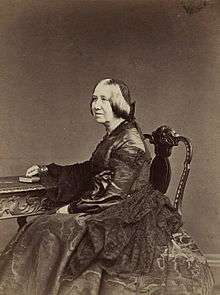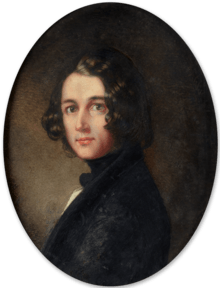Margaret Gillies
Margaret Gillies (7 August 1803– 20 July 1887) was a London-born Scottish painter, known for painting miniatures and water-colours.
Margaret Gillies | |
|---|---|
 Margaret Gillies, 1864 photograph | |
| Born | 7 August 1803 London, England |
| Died | 20 July 1887 (aged 83) Crockham Hill, Kent |
| Nationality | British |
| Known for | Painting |
Biography
Gillies was the second daughter of William Gillies, a Scottish merchant in Throgmorton Street, London, and his wife Charlotte Hester Bonnor (died 1811), daughter of Thomas Bonnor. Having lost their mother when Margaret was eight years old, and their father having met with business reverses, she and her older sister, Mary (1800-1870), were placed under the care of their uncle, Adam Gillies, Lord Gillies. They were educated by him, and then introduced to Edinburgh society.[1][2]
Before she was twenty, Gillies decided to earn her own living, and returned with her sister to her father's home in London. Mary Gillies became an author, while Margaret took the direction of a professional artist. She received lessons in miniature-painting from Frederick Cruikshank, and gained a reputation for it. Cruikshank's style was based on that of Andrew Robertson.[1][2]
In the early 1830s Southwood Smith, physician, Unitarian and a pioneer in the improvement of the health of the poor, particularly in London, separated from his second wife, Mary, and went to live with Gillies and her sister Mary.
The 1841 census records Margarett Gillies as aged 35 living at Hortet's Terrace, St.Pancras with Thomas Smith aged 50, Gertrude Hill aged 3, Harriet Lebe 21 and Sarah Hargrove 15. Smith and Gillies lived together in Highgate from 1844.[2] Smith, an ordained Unitarian minister, and Gillies associated with the group around the Monthly Repository, a Unitarian periodical; Mary Gillies was involved in editing it from 1836.[3][4] Margaret Gillies illustrated in 1842 Smith's first report as a mines inspector, on a tour in Leicestershire and West Yorkshire.[5]
Around 1850 Gillies was at 36 Percy Street, and was housing the "auto-icon" of Jeremy Bentham, on whose cadaver Southwood Smith had conducted a highly controversial public dissection in 1832.[6] She went in 1851 to Paris for a year, where she worked in the studios of Hendrik and Ary Scheffer, and on her return to England she exhibited some portraits in oils.[1][2] She then concentrated on water-colour painting, typically choosing domestic, romantic, or sentimental subjects, for which she was best known.[1] She joined the Society of Female Artists in 1856.[3] In 1854, short of money, they had moved to The Pines, near Weybridge. The 1861 census records Mary Gillies 60, authoress and Margaret Gillies 56, Artist in Water Colours, living at Heath House, Weybridge with Thomas S Smith, 72, physician and widower, his son Herman Smith 40, Wine merchant, his granddaughter Gertrude Hill 23, lady, and also a cook and servant. Thomas Smith died in 1861.[2]
Gillies lived for many years in Church Row, Hampstead. She died at The Warren, Crockham Hill, Kent, on 20 July 1887, of pleurisy, after a few days' illness.[1] Among her pupils was Marian Emma Chase,[7] and she gave early encouragement to Anna Mary Howitt.[8]
Works

Before she was 24, Gillies was commissioned to paint a miniature of William Wordsworth, and stayed at Rydal Mount for several weeks.[1] She has three oil paintings in British national collections—in Aberystwyth, Nottingham and the National Portrait Gallery.[9] Pamela Gerrish Nunn wrote that she "combined an early-Victorian aesthetic with a mid-Victorian independence of mind".[10]
Portrait artist
During the 1830s and 1840s Gillies was a career portrait artist, and for many successive years contributed portraits to the exhibitions of the Royal Academy.[1][11] Her subjects included feminist figures: Mary Leman Grimstone, Mary Howitt and her daughter Anna Mary Howitt, Harriet Martineau of the Monthly Repository group.[11][12] She also painted Anne Marsh the novelist.[1]
Her portrait of Charles Dickens, painted during the period when he was writing A Christmas Carol, was in the Royal Academy of Arts' 1844 summer exhibition.[13] After viewing it there, Elizabeth Barrett Browning said that it showed Dickens with "the dust and mud of humanity about him, notwithstanding those eagle eyes".[13] A simplified form was used as the frontispiece of a book, A New Spirit of the Age, in the same year. The painting's location was unknown, from later in Gillies' lifetime, when she was unable to trace it, until it was rediscovered in Pietermaritzburg, South Africa,[13][14] and acquired and restored by the art dealer Philip Mould in 2018.[15]
Watercolourist
In 1852 Gillies was elected an associate of the Old Society of Painters in Water-colours, and was a contributor to its exhibitions for the rest of her life. Her exhibited works included:[1]
- Past and Future, 1855, and The Heavens are telling, 1856, both of which were engraved;
- Rosalind and Celia, 1857;
- Una and the Red Cross Knight in the Cavern of Despair, An Eastern Mother, and Vivia Perpetua in Prison, 1858;
- A Father and Daughter, 1859;
- Imogen after the Departure of Posthumus, 1860;
- Beyond, 1861;
- The Wanderer, 1868;
- Prospero and Miranda, 1874;
- Cercando Pace, a drawing in three compartments, 1875; and
- The Pilgrimage, exhibited at the Royal Jubilee Exhibition at Manchester in 1887.
Her last work was Christiana by the River of Life, exhibited in 1887.[1]
Notes
- Stephen, Leslie; Lee, Sidney, eds. (1890). . Dictionary of National Biography. 21. London: Smith, Elder & Co.
- Yeldham, Charlotte. "Gillies, Margaret Southwood". Oxford Dictionary of National Biography (online ed.). Oxford University Press. doi:10.1093/ref:odnb/10745. (Subscription or UK public library membership required.)
- Rogers, Helen (2017). Women and the People: Authority, Authorship and the Radical Tradition in Nineteenth-Century England. Routledge. ISBN 9781315318004.
- Gaze, Delia; Mihajlovic, Maja; Shrimpton, Leanda (1997). Dictionary of Women Artists: Artists, J-Z. Taylor & Francis. p. 583. ISBN 9781884964213.
- Darley, Gillian. Octavia Hill: Lessons in Campaigning.” Octavia Hill, Social Activism and the Remaking of British Society, edited by Elizabeth Baigent and Ben Cowell, School of Advanced Study, University of London, London, 2016, pp. 27–44, at p. 31. JSTOR j.ctv4w3whm.9
- Rosen, F. "Bentham, Jeremy". Oxford Dictionary of National Biography (online ed.). Oxford University Press. doi:10.1093/ref:odnb/2153. (Subscription or UK public library membership required.)
- Yeldham, Charlotte. "Chase, Marian Emma". Oxford Dictionary of National Biography (online ed.). Oxford University Press. doi:10.1093/ref:odnb/32379. (Subscription or UK public library membership required.)
- Hirsch, Pam. "Howitt, Anna Mary". Oxford Dictionary of National Biography (online ed.). Oxford University Press. doi:10.1093/ref:odnb/63040. (Subscription or UK public library membership required.)
- 4 paintings by or after Margaret Gillies at the Art UK site
- Pamela Gerrish Nunn, Between Strong-Mindedness and Sentimentality: Women's Literary Painting, Victorian Poetry Vol. 33, No. 3/4, Word and Image (Autumn - Winter, 1995), pp. 425-447 at p. 437. Published by: West Virginia University Press. JSTOR 40002330
- Orr, Clarissa Campbell (1995). Women in the Victorian Art World. Manchester University Press. p. 61. ISBN 9780719041228.
- Peart, Sandra J. (2015). Hayek On Mill: The Mill-Taylor Friendship and Related Writings. Routledge. p. 25. ISBN 9781317562344.
- Brown, Mark (21 November 2018). "Lost portrait of Charles Dickens turns up at auction in South Africa". The Guardian. Retrieved 22 November 2018.
- "Lost portrait of Charles Dickens found in South Africa". CNN Style. 21 November 2018. Retrieved 25 November 2018.
- "Charles Dickens: The Lost Portrait Now Open". Philip Mould. 8 November 2018. Retrieved 22 November 2018.
- Attribution
![]()
External links
- 4 paintings by or after Margaret Gillies at the Art UK site
| Wikimedia Commons has media related to Margaret Gillies. |